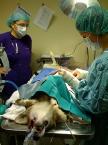What to Expect in Surgery
Being a vet tech is going to mean that you are going to be assisting the veterinarian in surgery. Before you decide to go through school to be a vet tech, you need to make sure that you are going to be able to handle what you will see and smell during animal surgery. Sometimes surgery isn’t so bad, like in the case of a deep wound that needs to be sutured. A case like that can usually be done with a little Lidocaine and on the table in the exam room. Wounds like that are what a lot of vet techs expect when they start school. However, when that turns out not to be the case, some students decide right away they are not cut out to be a vet tech.
Cover the Olfactory Organ-Your Nose!

Aside from the fact that the intestines, the liver, and the kidneys do look unquestionably more disgusting in real life than they do on television, another fact of real life veterinarian surgery is the smell of all that blood and the gases inside an animal’s belly. Some students decide the smell alone is not worth getting used to or even trying to get used to. Others, however, find that a smell is easy enough to deal with and they rub a little Vick’s Mentholatum salve under their nostrils and carry on with the cutting.
The smell of blood and internal organs aren’t the only smells you will need to learn to deal with during animal surgery.Most of the time, as soon as anesthesia is given and you get that animal laid back to start preoperative prepping, like shaving the tummy,the inevitable defecation occurs. You will learn to start expecting with a hand in glove so you can (this may sound really gross, but you are wearing a protective glove!) catch and immediately turn the glove inside out off your hand so the smell and the mess in quickly subdued. then just toss the glove into the trash and continue with your prepping. Urine, as you may need to express a bladder or two, is the least worst of all these smells. if you have no problems with the smells in animal surgery,you should do alright with what it looks like.
For more information on how to become a vet tech, please visit:www.allalliedhealthschools.com/faqs/veterinary_tech.php